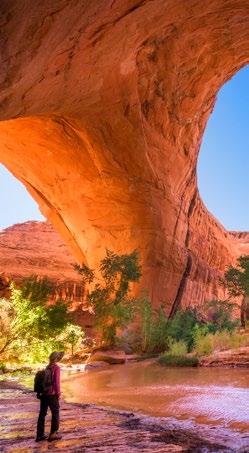
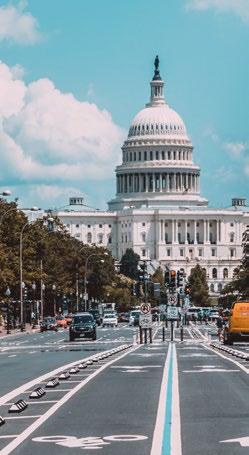


2
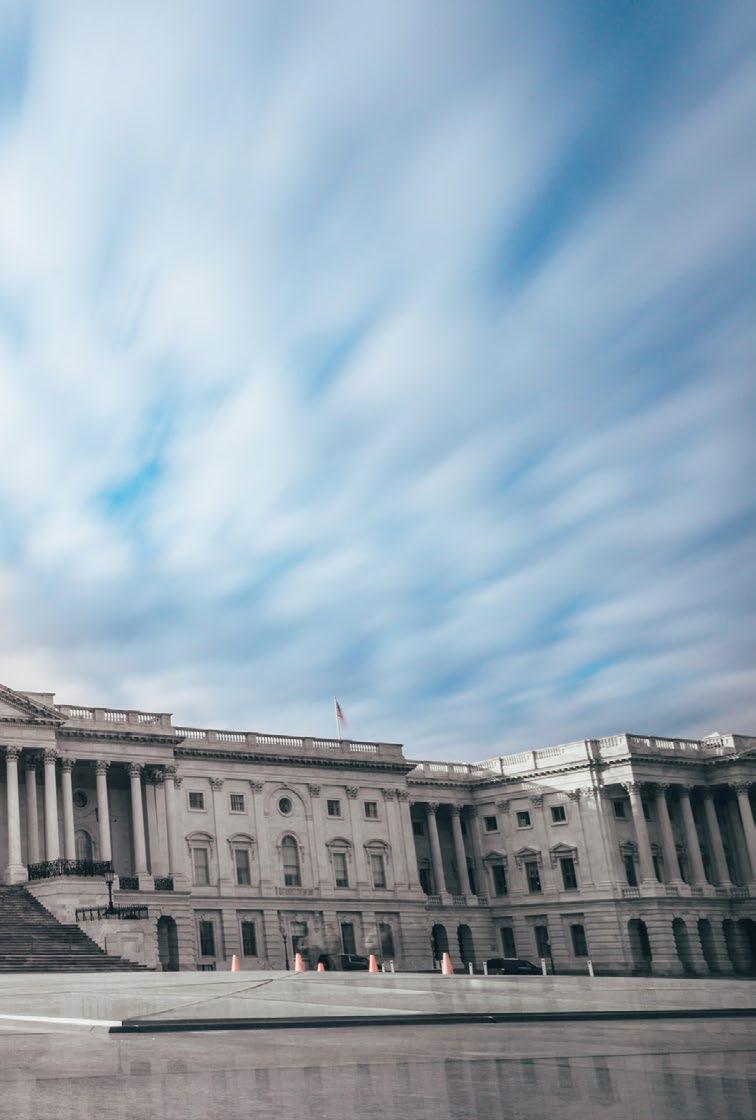
TABLE OF CONTENTS WELCOME LETTER 4 TRAVEL AND LOGISTICS 6 SCHEDULE OF EVENTS 10 2023 FRIEND OF THE OUTDOOR INDUSTRY AWARD 12 THRIVE OUTSIDE COMMUNITY GATHERING 14 2023 OUTDOOR INDUSTRY ASSOCIATION POLICY AGENDA 15 2023 CAPITOL SUMMIT POLICY BRIEFINGS 18 America’s Outdoor Recreation Act 18 Equitable Access to the Outdoors 20 Farm Bill 21 International Trade Priorities 23 Climate 26 OIA State and Local Government Affairs Priorities 28 ACRONYMS, AGENCIES, AND KEY LEGISLATION 30 HOW TO SOCIAL AT CAPITOL SUMMIT 36 LOOKING AHEAD: HOW TO IMPLEMENT CAPITOL SUMMIT OUTCOMES FOR OUTDOOR INDUSTRY BUSINESSES 38 3 #OIACapitolSummit
Dear outdoor industry friends and fellow catalysts,
Welcome to Washington, D.C., for the 2023 Outdoor Industry Association Capitol Summit! Our team is excited to reconvene in our nation’s capital to galvanize outdoor industry leaders, policymakers, and elected officials and advocate for the outdoor economy, outdoor participation, and the planet.

Since our last Capitol Summit in 2019, more than 10 million Americans participated in outdoor recreation for the first time, or for the first time in years. This increase in the number of people spending time outside was not a moment in time for managing stress from lockdown during a global pandemic. We witnessed a multigenerational mind shift around the physical, mental, and emotional health benefits of spending time in nature, as over half of the U.S. population flocked to the outdoors. As you know, this massive spike in participation led to greater spending within the outdoor recreation economy, to a whopping $862 billion in 2021, accounting for 1.9 percent of GDP and a record-breaking 4.5 million jobs in the U.S. The cascading effects have also been felt in our policy and advocacy wins at the federal, state, and local levels, including the creation of new outdoor recreation offices and sizeable increases in investments in outdoor access and climate mitigation in every region. There is no question that the outdoor industry is an economic and social force that has captured the attention of policymakers and has made its way to a topline agenda item on the desks of the Capitol.
We have made great progress in the past three years, but we cannot stop now. The intersectional issues we identified as some of our greatest opportunities in 2022 –climate change, inclusion, and outdoor equity – are priorities that underpin our policy platform in 2023.
Over the next two days, OIA will reveal how we will continue to advocate for increased access and equity to the outdoors and thriving outdoor businesses.
4
1. We must urge Congress to pass the largest comprehensive package of recreation bills in a generation and help ensure that the outdoors are open and accessible to all Americans.
2. We must keep fighting on behalf of the planet and the beautiful natural landscapes which so many of our favorite activities are dependent upon.
3. We must fuel the innovation and job growth of outdoor businesses by passing a package of miscellaneous tariff bills (MTBs) and renewing the Generalized System of Preferences (GSP).
4. We need to continue to show support for state-based offices of outdoor recreation and increasing investments in the outdoors at the state and local levels.
Thanks to your voices and focused energy, it is safe to say that OIA is not the only catalyst in this room. OIA staff and I find ourselves in great company with you, our members who continue to show up for action. Together, we are a member-led collective and the industry’s catalyst for meaningful change. That makes us a very passionate group of business leaders, climate experts, policymakers, and outdoor enthusiasts who are committed to sustainable economic growth and climate positivity while protecting—and growing access to—the benefits of the outdoors for everyone.
I see you and every member, staff member, board member, voter, donor, and outdoorist as a catalyst for change, sustainable growth, collective action, inclusion, and connection.
So, thank you for making the trek to D.C. and for representing our passionate outdoor community, your company, and the climate-forward values of this industry.
 Kent Ebersole President, Outdoor Industry Association
Kent Ebersole President, Outdoor Industry Association

5 #OIACapitolSummit
TRAVEL AND LOGISTICS
TRANSPORTATION IN WASHINGTON, D.C.
Getting around D.C. is easy! There are many transportation options depending on the distance you need to travel. However, we recommend that you do not rent a car. With taxis, the Metro (D.C.’s public transit service), and Uber/Lyft, there are plenty of options to help get you where you’re going.
For the OIA Lobby Day on the Hill, transportation will be provided from the hotel. Once on the Hill, your team leader will direct you to your meetings. Our meetings will be in and around the Capitol building in the House and Senate offices. The House offices are concentrated on the south side of the Capitol, while the Senate offices are on the north side, and offices within each side are about 5-10 minutes (walking distance) apart. But to walk from the House to the Senate side or vice versa, it may take 15-20 minutes, which includes some time for the magnetic security screening (similar to screening for a concert or professional sporting event).
OUR HOTEL AND EVENT CENTER
Eaton DC
Address: 1201 K Street NW, Washington, D.C. 20005
The Eaton DC is home base for the OIA Capitol Summit. Our Lobby Prep Day on Tuesday, April 18, will be held in the hotel. The Eaton has a yoga studio, meditation room, and infrared sauna (for an additional cost), but no fitness center. Luckily, spring is the best time to go for a run or rent a bike through Capital Bikeshare. Looking for a route? Reach out to Hannah at hwintucky@outdoorindustry.org for suggestions.
The Eaton is home to Baker’s Daughter, an all-day café with breakfast, coffee, and baked goods, if you are looking for your latte or pastry fix in the morning. The Eaton also has a rooftop bar, a cocktail bar, and Gravitas, a French-American restaurant.
If you are looking to take a stroll with your morning coffee, head to Slipstream Downtown for a latte or Nino’s Bakery for a croissant (both about a block away) and walk through Franklin Park, adjacent to the Eaton. Looking for a late-night snack? Walk seven minutes to Stan’s DC (open until midnight) for some steamed shrimp or their signature mumbo wings, or walk seven minutes to one of the Wawa’s convenience stores nearby.
There is a CVS retail pharmacy about a block from the hotel if you need anything during your stay. The nearest hospital is George Washington University Hospital, about a mile and a half east of the hotel. The nearest walk-in urgent care center is GW Primary Care – McPherson Square, about an eight-minute walk from the hotel. If you have an emergency or need to get into contact with members of the OIA government affairs team, please call or text Rich Harper, Rebecca Gillis, or Hannah Wintucky.
6
HOW TO GET TO AND FROM NEARBY AIRPORTS
RONALD REAGAN WASHINGTON NATIONAL AIRPORT (DCA)
To/from the Eaton DC hotel
PUBLIC TRANSPORTATION
About 25-40 minutes, depending on the time between trains. Metro fare: About $2.40 one way
DC Metro to the Eaton hotel from DCA
Head out of the airport following “Ground Transportation” signs, and cross over to the Metro platform. Stop at the kiosk to grab a Metro card, or add a SmarTrip card to your phone’s mobile wallet. Grab the BLUE LINE in the direction of New Carrollton/Largo Town Center, ride for 8 stops, and exit at McPherson Square. Walk 10 minutes or take a taxi/Uber/Lyft from McPherson Square, about four blocks to the hotel (~0.3mi).
DC Metro to DCA from the Eaton hotel
Walk 10 minutes or take a taxi/Uber/Lyft from the Eaton DC to McPherson Square, about four blocks from the hotel (~0.3mi). Hop on the BLUE LINE (BLUE is the only line that goes to DCA) toward Franconia/Springfield, ride for 8 stops, and exit at Reagan National Airport.
TAXI/UBER
About 10-20 minutes, depending on traffic. Pricing to/from the Eaton hotel (depending on price surging)
UberX: $14 - $30
UberBLACK: $30 - $42
UberXL: $17 - $30
UberSUV: $42 - $58
Taxi: $15 - $27 before gratuity. Phone: 202.544.1212

7 #OIACapitolSummit
DULLES INTERNATIONAL AIRPORT (IAD)
To/from the Eaton DC hotel
PUBLIC TRANSPORTATION
About 60-80 minutes, depending on the time between trains Metro fare: About $3.85 one way
DC Metro to the Eaton hotel from IAD
Head through the pedestrian tunnel toward “Airport Parking Garage 1,” and walk until you see the Metro entrance. Stop at the kiosk to grab a Metro card, or add a SmarTrip card to your phone’s mobile wallet. Grab the SILVER LINE in the direction of Largo Town Center, ride for 17 stops, and exit at McPherson Square. Walk 10 minutes or take a taxi/Uber/Lyft from McPherson Square, about four blocks to the hotel (~0.3mi).
DC Metro to IAD from the Eaton hotel
Walk 10 minutes or take a taxi/Uber/Lyft from the Eaton DC to McPherson Square, about four blocks from the hotel (~0.3mi). Grab the SILVER LINE (SILVER is the only line that goes to Dulles) in the direction of Ashburn/Washington Dulles, ride for 17 stops, and exist at Washington Dulles Airport.
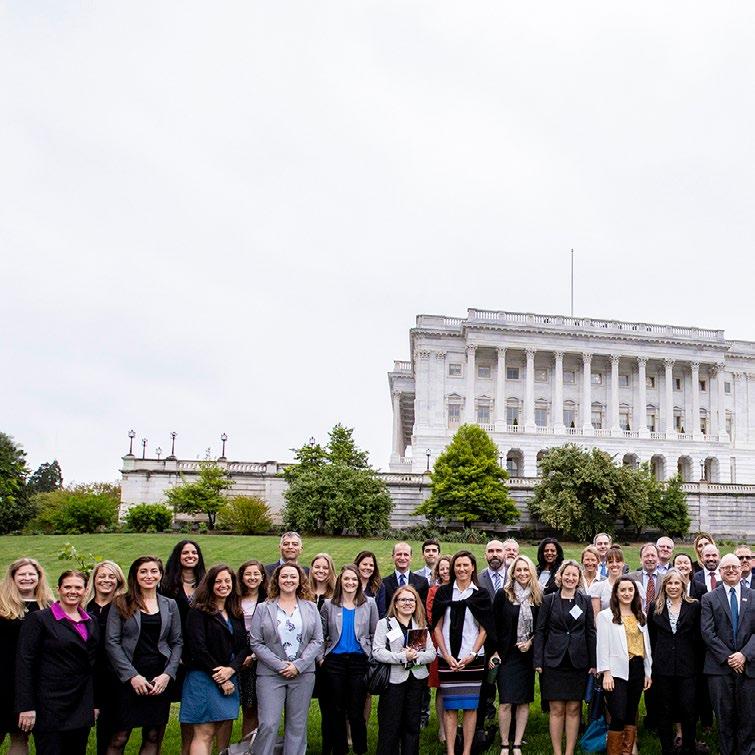
TAXI/UBER
About 35-50 minutes, depending on traffic. Pricing to/from the Eaton hotel (depending on price surging)
UberX: $40 - $55
UberXL: $80 - $100
UberBLACK: $90 - $120 UberSUV: $115 - $130
Taxi: $65 - $100 before gratuity. Phone: 202.544.1212
8
BALTIMORE-WASHINGTON INTERNATIONAL AIRPORT (BWI)
To/from the Eaton DC
TAXI/UBER
About 40-60 minutes, depending on traffic. Pricing to/from the Eaton hotel (depending on price surging)
UberX $45.00 - $65.00
Uber Black $100.00 - $150.00
UberXL $80.00 - $100.00
Uber Black SUV $145.00 - $170.00
Taxi: $75.00 - $120.00 before gratuity. Phone: 202.544.1212
DRESS TO IMPRESS
PLEASE WEAR BUSINESS ATTIRE FOR LOBBY DAY

For the Lobby Prep Day on Tuesday, April 18, outdoor business casual or business casual is suitable.
For our Lobby Day on the Hill on Wednesday, April 19, remember to dress to impress. A suit and tie are appropriate for men. A blazer and a dress, skirt, or pants is appropriate for women. Comfortable shoes are recommended for everyone — there will be a lot of walking. Check the weather before you depart for D.C. — during inclement spring weather, an umbrella or raincoat is advisable. If you have questions about attire, please email Hannah Wintucky.
9 #OIACapitolSummit
SCHEDULE OF EVENTS
TUESDAY, APRIL 18
10 a.m. – 12 p.m.
Attendee Check-In
Beverly Snow Room, Second Floor
Eaton DC, 1201 K St NW, Washington, DC 20005
Stop by, check in, and get prepared for the 2023 OIA Capitol Summit!
12 – 1 p.m.
Welcome Keynote and Lunch
Beverly Snow Room, Second Floor
Eaton DC, 1201 K St NW, Washington, DC 20005
Join us as we kick off the 2023 Capitol Summit with Secretary of the Interior, Deb Haaland. Sec. Haaland is a member of the Pueblo of Laguna and the first Native American to serve in a cabinet secretary position. In 2018, Sec. Haaland was elected to the U.S. House of Representatives in New Mexico’s first district, where she served as vice chair of the House Committee on Natural Resources. During her time in the House, she also served on the Subcommittee for Indigenous Peoples of the United States and chaired the Subcommittee on National Parks, Forests, and Public Lands.
1 – 5 p.m.
Lobby 101 Meetings and Education Sessions
Beverly Snow Room, Second Floor
Eaton DC, 1201 K St NW, Washington, DC 20005
In these mandatory education sessions, attendees will learn about OIA’s 2023 policy priorities. You will emerge from these presentations empowered and prepared to discuss important recreation, trade, outdoor access, and climate issues on Capitol Hill.
5:30 – 7:30 p.m.
Thrive Outside Community Event
Transportation to and from the Eaton DC hotel will be provided
Anacostia Park, 1900 Anacostia Dr., Washington, DC 20020
We are eager to invite OIA members to gather with D.C. community leaders and policy professionals to discuss equity and access in the outdoors while getting to know the outdoor culture of D.C. This event is hosted in partnership with Friends of Anacostia Park, the Outdoor Foundation Thrive Outside Community in Washington, D.C. Attendees will have the opportunity to discuss outdoor access and equity and network with advocates from the grassroots to grasstops levels while enjoying an evening in historic Anacostia Park. Appetizers and beverages will be served.
10
WEDNESDAY, APRIL 19
7:30 – 8:30 a.m.
Breakfast and Lobby Team Meetings
Beverly Snow Room, Second Floor
Eaton DC, 1201 K St NW, Washington, DC 20005
Come prepare for the main event! Join us at breakfast prior to departing for Capitol Hill. We will use this time to get lobbying teams arranged and prepared for their advocacy meetings.
8:30 a.m.
Capitol Hill Meetings
Transportation will be provided to and from Capitol Hill
Depart from the Eaton DC hotel lobby
Eaton DC, 1201 K St NW, Washington, DC 20005
9 a.m. – 5 p.m.
Lobby Meetings
Various Locations
Capitol Hill
Lobby groups will have team leads responsible for getting OIA members to various meetings throughout the day. Enjoy!
5:00 – 7:30 p.m.
Friend of the Outdoor Industry Award Reception
Dirksen Senate Office Building SD-G50 (committee meeting room)
50 Constitution Ave NE, Washington, DC 20002
Join OIA Capitol Summit attendees, members of Congress, and other friends for an evening reception honoring our 2023 Friend of the Outdoor Industry Award recipients. We will be serving heavy appetizers and beverages for attendees.
11 #OIACapitolSummit
2023 FRIEND OF THE OUTDOOR INDUSTRY AWARD
The Friend of the Outdoor Industry Award is presented to a member of Congress in recognition of their legislative leadership around outdoor recreation and their dedication to supporting the outdoor industry. This year, awards will be presented to Senator Joe Manchin (D-WV), Representative Adrian Smith (R-NE), and Representative Nanette Barragán (D-CA).
SENATOR JOE MANCHIN

As the chair of the Senate Committee on Energy and Natural Resources, Senator Manchin was instrumental in the passage of the Inflation Reduction Act, the most comprehensive piece of climate change legislation in history. Senator Manchin has been a longtime champion of the outdoor industry and is a lead sponsor of “America’s Outdoor Recreation Act,” a historic package of recreation bills that would greatly support outdoor recreation on our public lands and waters.
REPRESENTATIVE ADRIAN SMITH
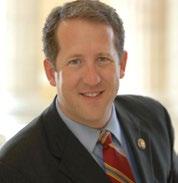
Representative Smith is the chair of the Trade Subcommittee of the House Ways and Means Committee and a longtime champion of the outdoor economy and OIA’s balanced trade agenda. He helped lead the effort to add travel goods to the Generalized System of Preferences (GSP), resulting in $300 million in duty savings annually for outdoor companies and a $5 billion shift of trade out of China. Representative Smith will be a leader in the effort to renew GSP and pass a package of miscellaneous tariff bill (MTBs) that will directly impact the bottom line of outdoor companies.
REPRESENTATIVE NANETTE BARRAGÁN
Representative Barragán is dedicated to equitable access to the outdoors for all Americans, particularly from underserved communities. She is a lead sponsor of the “Outdoors for All Act” to codify the Outdoor Recreation Legacy Partnership (ORLP) program and provide muchneeded funding for urban green spaces. Representative Barragán is the chair of the Congressional Hispanic Caucus and the co-chair of the United for Climate and Environmental Justice Congressional Task Force.

12
PREVIOUS FRIEND OF THE OUTDOOR INDUSTRY AWARD RECIPIENTS:
2019: Rep. Suzan DelBene (D-WA), Rep. Brian Fitzpatrick (R-PA), Sen. Rob Portman (R-OH), Sen. Catherine Cortez Masto (D-NV)
2018: Rep. Elise Stefanik (R-NY), Rep. Erik Paulsen (R-MN), Sen. Jon Tester (DMT), Governor Steve Bullock (D-MT), Governor John Hickenlooper (D-CO), Governor Matt Mead (R-WY)
2017: Sen. Cory Gardner (R-CO), Sen. Jeanne Shaheen (D-NH), Rep. Dave Reichert (R-WA), Rep. Don Beyer (D-VA)
2016: President Barack Obama, Sen. Martin Heinrich (D-NM), Rep. Suzanne Bonamici (D-OR), Rep. Mike Simpson (R-ID)
2015: Sen. Kelly Ayotte (R-NH), Rep. Jared Polis (D-CO)
2014: (No award given)
2013: Sen. Max Baucus (D-MT)
2012: Sen. Jeanne Shaheen (D-NH), Rep. Dave Reichert (R-WA)
2011: Sen. Ron Wyden (D-OR), Sen. Richard Burr (R-NC)
2010: Rep. Mike Castle (R-DE), Rep. Earl Blumenauer (D-OR), Sen. Jeff Bingaman (D-NM)
2009: Sen. Maria Cantwell (D-WA), Rep. Raul Grijalva (D-AZ)
2008: Sen. Gordon Smith (R-OR), Rep. Mark Udall (D-CO)
2007: Secretary of the Interior Dirk Kempthorne, Sen. Lamar Alexander (R-TN), Sen. Thomas Carper (D-DE), Sen. Ken Salazar (D-CO)
2006: Sen. Conrad Burns (R-MT), Sen. Susan Collins (R-ME), Sen. Judd Gregg (RNH), Sen. Ken Salazar (D-CO)
2005: Sen. Lamar Alexander (R-TN), Sen. Mary Landrieu (D-LA)
2004: Sen. Patty Murray (D-WA), Rep. Sherwood Boehlert (R-NY)
2003: Rep. David Obey (D-WI), Rep. Nancy Johnson (R-CT)
2002: Rep. Norm Dicks (D-WA)
2001: Rep. George Miller (D-CA), Sen. Mike DeWine (R-OH)
13 #OIACapitolSummit
YOU’RE INVITED!
Please join us at Anacostia Park on Tuesday, April 18, 2023, for the Thrive Outside Community Gathering, an event centered around outdoor access, equity, and inclusion. Hosted by Friends of Anacostia Park, Outdoor Industry Association, and Outdoor Foundation, the event will be an opportunity for attendees to learn more about the Nature Gap and the way OIA, OF, and groups like Friends of Anacostia Park are working together to erode the barriers to outdoor access.

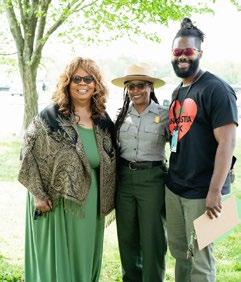
Come join us at the park! We will have beverages and snacks, great dialogue, hand dancing, and a chance to engage in community.
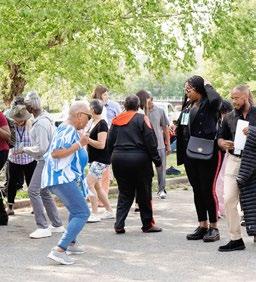
DATE: Tuesday, April 18, 2023
TIME: 5:30 p.m. - 7:30 p.m.
Programming will start at approximately 6:00 p.m.
LOCATION: Anacostia Park Roller Skating Pavillion
1500 Anacostia Dr., Washington, D.C., 20020
DRESS CODE: Casual – bring gear to match the weather!
Please email ga@outdoorindustry.org with any questions. See you there!
OUTSIDE COMMUNITY GATHERING
14
2023 OUTDOOR INDUSTRY ASSOCIATION POLICY AGENDA
FEDERAL CLIMATE
• Protect the climate investments made in the Inflation Reduction Act (IRA) to allow for full implementation of the bill’s goal to reduce U.S. greenhouse gas emissions by 40% by 2030
• Trailblaze a path for new and innovative climate investments left out of IRA
• Authorize and fund a Civilian Conservation Corps
CONSERVATION AND RECREATION
• Protect core conservation laws and reverse regulatory rollbacks
• Support America’s Outdoor Recreation Act (AORA), a package of numerous recreation bills, which invests in recreation and green infrastructure to enhance access to public lands
• Continue to support legislation that bolsters the $862 billion outdoor recreation economy and 4.5 million outdoor recreation jobs in the U.S.
EQUITABLE ACCESS TO THE OUTDOORS
• Prioritize expanding safe access to the outdoors to optimize individual and societal health, economic, and social outcomes
• Recognize and address barriers to outdoor access, such as time, proximity, financial resources, historical or cultural factors, and discrimination
• Support the development of green spaces in traditionally nature-deprived communities
FARM BILL
• Bolster and grow specific existing grant opportunities under the Rural Development Title VI to further support gateway communities and outdoor recreation economies
– Grants allow recipients to better manage, expand, and enhance their recreation infrastructure while supporting the development of the outdoor industry by supporting small and medium-sized businesses in rural America.
• Authorize and fully fund a Civilian Climate Corps under the conservation title to initiate the creation of a sustainable workforce focused on implementing naturebased climate solutions
15 #OIACapitolSummit
• Support innovative policies for climate-smart agriculture, including the Growing Climate Solutions Act.
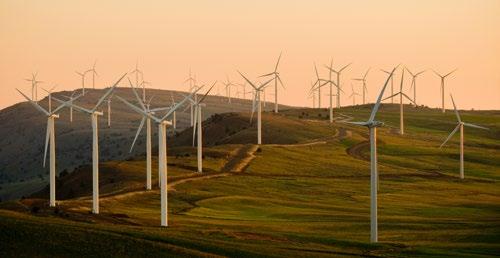
• Require the United States Forest Service (USFS) to develop a 10-year outdoor recreation strategy for national forests under the forestry title
INTERNATIONAL TRADE
• Renew the Generalized System of Preferences (GSP), a developing-country trade preference program and include the addition of a select number of non-import sensitive performance footwear
• Support the passage of a package of miscellaneous tariff bills (MTBs) that will provide temporary duty relief on certain outdoor products and preserve finished products for future MTB rounds
• Reorient China 301 tariffs away from consumer goods and support a new process to exclude imports from the China 301 tariffs to provide relief for small and medium-sized businesses
• Support the development of new trade agreements that promote reciprocal market access, sustainability, and robust and enforceable labor and environmental provisions that match international standards
STATE AND LOCAL
OUTDOOR ACCESS
• Advocate for the creation and funding of state-based outdoor equity funds and similar outdoor education programs
• Encourage increased funding for both new recreation infrastructure and maintenance of existing recreational assets across states
• Execute state-by-state advocacy to encourage governors and lawmakers to prioritize outdoor access when considering options for surplus spending
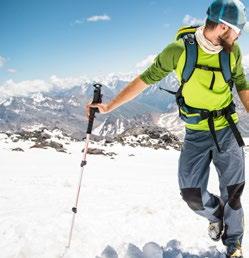
16
OUTDOOR RECREATION ECONOMY
• Support the creation of new state-based offices of outdoor recreation
• Continue developing networks and resources to strengthen already-existing offices and directors of outdoor recreation on an individual basis and through the Confluence of States
• Partner with state-based outdoor business alliances to build their capacity in representing their constituent businesses in outdoor policy advocacy
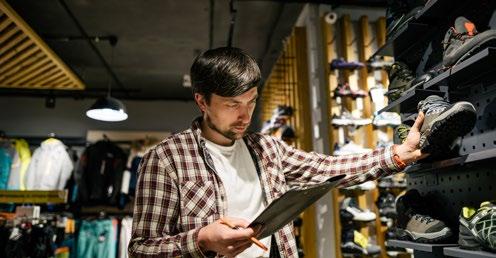

• Keep members apprised of pertinent regulatory legislation and policies across the U.S. (e.g., PFAS, green chemistry, and ESG policies), providing opportunity for industry feedback and advocacy on pertinent policies
• Continue to report on opportunities for local communities and states to utilize federal funding implementation for recreation, conservation, and climate mitigation (e.g., Bipartisan Infrastructure Law, Great American Outdoors Act, and Inflation Reduction Act)
CLIMATE
• Monitor and influence state climate and sustainability laws that impact the industry, and enable OIA members to participate in state-by-state climate advocacy opportunities
• Where appropriate, advocate for further electrification, electric vehicle (EV) infrastructure, and e-bike infrastructure
• Amplify OIA members’ voices on policies promoting environmental justice
CONSERVATION
• Advocate for the development of new, sustainable mechanisms for conservation funding and also for the renewal of previously dedicated funds
• Work with relevant national and local partners to engage in state-level advocacy for national monuments and other landscape-scale protections
• Advocate for state laws and administrative policies that contribute to the overall goals of Conserving and Restoring America the Beautiful, which calls to protect 30% of the nation’s lands and waters by 2030
17 #OIACapitolSummit
2023 CAPITOL SUMMIT POLICY BRIEFINGS
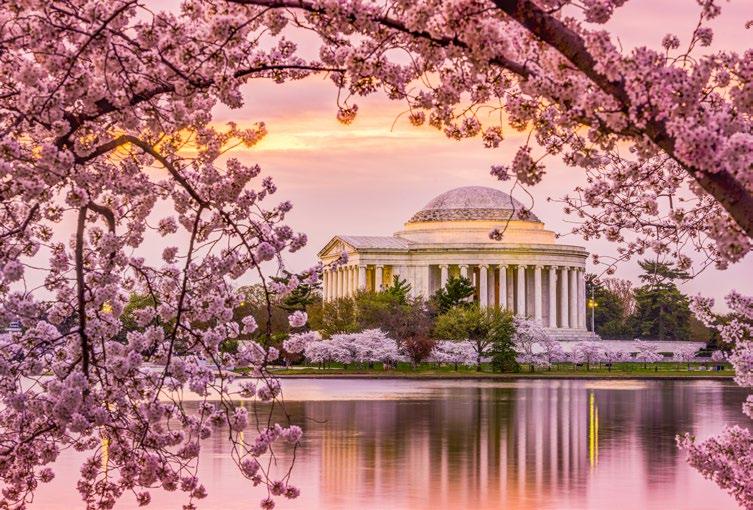
AMERICA’S OUTDOOR RECREATION ACT
America's Outdoor Recreation Act (AORA) is one of the most comprehensive pieces of bipartisan legislation introduced in recent history to benefit the outdoor industry. This act combines components of previously introduced bills, including the Recreation Not Red-Tape Act, the SOAR Act, and the Outdoors for All Act. In addition to formerly introduced provisions, newly introduced provisions will broadly improve outdoor recreation opportunities across the country while benefiting the environment, the economy, and the health of people across the United States.
Outdoor recreation is a cornerstone of American life, with over 162.4 million individuals (54% of the nation’s population) getting outside each year. In addition to expanding the outdoor participant base, AORA will help unlock additional economic potential for the country. The outdoor recreation industry is already a pillar of our economy, contributing more than $862 billion annually and supporting 4.5 million jobs nationwide. The passage of AORA will increase the power of our industry and will continue to support the cherished lifestyle of millions of people across the country.
18
RECREATION ACTIVITY AND SITE IMPROVEMENTS PROPOSED IN AORA
• Supports the expansion and safe development of diverse recreation opportunities, such as long-distance bike trails, watersports, climbing, and target shooting
• Improves recreation infrastructure by providing modernized campsites, broadband internet, and increased parking
• Supports gateway communities (communities adjacent to recreation destinations) through increased financial and technical assistance
• Establishes programs that support public-private partnerships to modernize infrastructure and create more recreation opportunities
• Allows some public lands passes and permits to be purchased online and for those passes to be transferable across management jurisdictions
• Extends recreation seasons based on visitor trend data and local business input
• Identifies locations for recreation improvements based on user trends and resource inventory
RECREATION ACCESS, PUBLIC ENGAGEMENT, AND DATA COLLECTION IMPROVEMENTS PROPOSED IN AORA
• Increases access to public lands and recreation for service members, veterans, youth, and underserved populations
• Specifically, more opportunities for outdoor wellness programs will become available for service members and veterans
• Establishes a Federal Interagency Council on Recreation (FICOR) to oversee the implementation of AORA
• Streamlines and digitizes permitting and fee processes for guides and outfitters
• Allows for more flexibility with permits, increasing the amount of time outfitters and guides can spend with clients outdoors
• Requires agencies to report closures in real time
• Creates new opportunities for data collection and monitoring to provide critical information on outdoor recreation on federal lands, including the following:
• Tracking visitor trend data, including real-time visitor data and types of visitation that have been historically difficult to track
• Monitoring federal investments in outdoor recreation to show the true return on investment of outdoor recreation
• Expands volunteer opportunities on federal lands
• Improves mapping imagery of federal lands, which will allow for better planning and incident mitigation
19 #OIACapitolSummit
EQUITABLE ACCESS TO THE OUTDOORS
As we see the increased pace of the creation of several state-based outdoor equity funds, Senator Martin Heinrich (D-NM) has begun collaborating with the Outdoor F.U.T.U.R.E. (Fund for Underrepresented, Tribal, Urban, and Rural Equity) initiative to develop legislation to increase access to public lands for underserved communities. This legislation will elevate the importance of equitable access to the outdoors across the nation, while also establishing a sustainable funding mechanism for existing and yet-to-come state-based outdoor equity funds and organizations doing the work to erode barriers to nature.
At the state level, outdoor equity funds provide nature-deprived groups with the opportunity to experience the many benefits of time outdoors. These funds are statelevel investments—sometimes matched by private or philanthropic funding—that support existing community-based organizations in providing underserved groups access to nature and the outdoors.
Safe, close-to-home access to the outdoors and nature is vital to people’s physical, mental, and emotional wellbeing. Policymakers at the local, state, and federal levels must prioritize expanding safe access to the outdoors to optimize individual and societal health, economic, and social outcomes. We believe the support of Senator Heinrich’s legislation will enable a large step forward in closing the nature gap in our nation’s underserved communities.
The draft legislation developed by Senator Heinrich and Outdoor F.U.T.U.R.E will:
• Establish the National Outdoor Equity Foundation to advance relevant efforts to increase access to outdoor recreation across the nation. This mandate will be accomplished through the creation of an Outdoor Equity Grant Program, which will be funded through the foundation
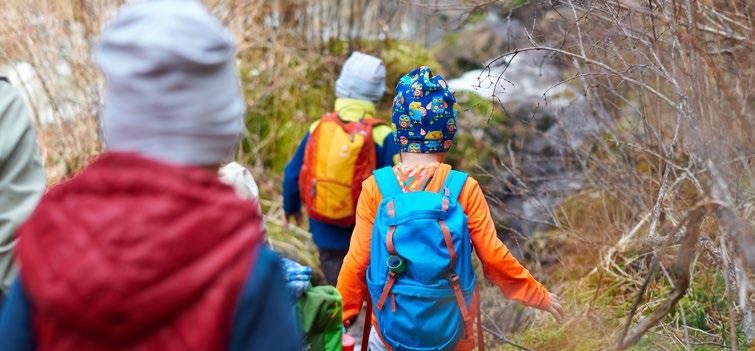
• Require the establishment of an inclusive and representative board to oversee governance and administration of the foundation and grant program
• Allow the Secretary of Interior to provide appropriated funds to the Foundation to enable full development and pursuance of the Outdoor Equity Grant Program
20
FARM BILL
Every five years, Congress is obligated to reauthorize the farm bill—a massive piece of legislation that provides funding and direction to the United States Department of Agriculture (USDA) for numerous agricultural and food programs, as well as rural development, natural resource conservation, and forestry programs. Historically, outdoor recreation has generally benefitted from farm bill funding aimed at incentivizing better conservation practices on farms and ranches, as well as improved management of United States Forest Service (USFS) lands.
More recently in the farm bill, Congress has started to address the importance of outdoor recreation businesses in America’s rural economies through USDA Rural Development programs. There is a tremendous opportunity in the farm bill being written for passage this year to expand and improve programs that help rural economies better attract and retain outdoor recreation businesses. The full potential of USDA Rural Development programs to build up rural economies through better support for outdoor recreation has only just begun to be explored by the outdoor industry.
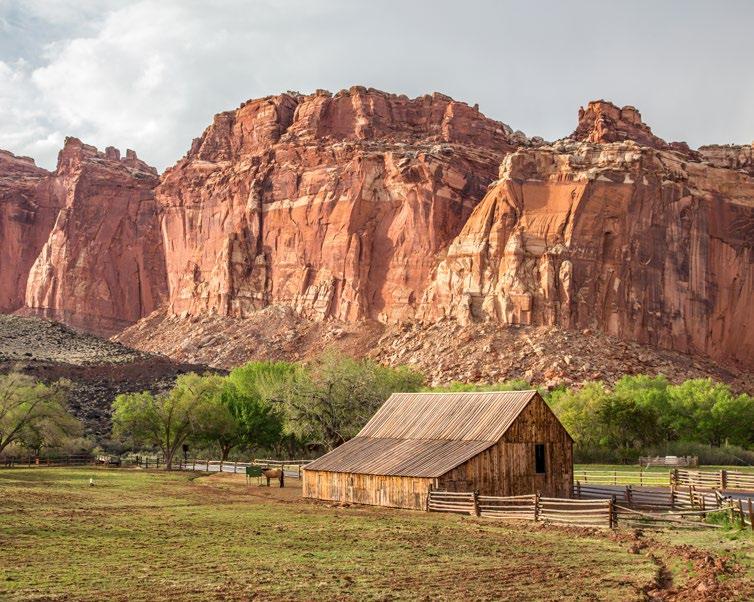
21 #OIACapitolSummit
RURAL DEVELOPMENT TITLE
• Update language in numerous rural development grant programs to give preference to projects that bolster the development of outdoor recreation infrastructure
– Grant programs include the Rural Innovation Stroger Economy Grants (RISE), Rural Business Development Grants (RBDG), and the Rural Community Facilities Program (RCFP).
• Leverage the Rural Housing and Community Development Service (RHCDS) and the Rural Communities Facilities Program (RCFP) to develop affordable housing in gateway communities employing people in outdoor recreation to help recruit and retain a skilled and stable workforce in underdeveloped rural areas
• Establish an Outdoor Recreation Business Office in the Rural Development Office of USDA to aid rural communities in development of their recreation economies
• Include the Rural Outdoor Investment Act to permanently authorize the Recreation Economy for Rural Communities program
CONSERVATION TITLE
• Authorize and fund the Civilian Climate Corps
• Increase or maintain funding for climate resiliency programs authorized in this title and being carried out by USDA, including the Conservation Reserve Program (CRP), Conservation Stewardship Program (CSP), Environmental Quality Incentives Program (EQUIP), Wetland Reserve Program (WRP), and others
• Maintain funding for the Voluntary Public Access and Habitat Incentive Program (VPA-HIP) to bolster public access to farmland and ranchland
• Include the Growing Climate Solutions Act to incentivize landowners to implement nature-based climate solutions on their land
FORESTRY TITLE
• Require the USFS to develop a 10-year outdoor recreation strategy for national forests
• Require the USFS to audit the accessibility of trails and outdoor recreation sites
22
INTERNATIONAL TRADE PRIORITIES
A stable and predictable U.S. federal trade policy is critical to helping outdoor companies lower costs, create U.S. jobs, and fuel the development of new, innovative outdoor apparel, footwear, and equipment. OIA advocacy on trade is guided by our “balanced trade agenda”:
• We support the elimination of import tariffs on outdoor products where there is no viable domestic production.
• We support policies to help our “Made in USA” members compete in a global economy. Consistent with policy that supports global value chains and domestic manufacturers, we urge Congress and the administration to support federal tariff reform and specific initiatives that relieve outdoor businesses of the disproportionately high and unnecessary import taxes that stifle innovation, suppress U.S. jobs, and artificially inflate retail prices on outdoor products. These actions include the following:
• A long-term renewal of the Generalized System of Preferences (GSP) and a refund of duties paid since January 1, 2021
OIA led the effort to make backpacks, sports bags, and other travel goods duty-free from GSP-eligible countries, resulting in $300 million in duty savings in 2020 and a $5 billion shift of trade in travel goods out of China to countries like Indonesia, Thailand, and the Philippines. Since GSP expired at the end of 2020, however, outdoor companies have paid an estimated $1.65 billion in duties on eligible products.
These funds could have been used to create new U.S. jobs, develop innovative, hightech outdoor products and spur economic growth. Frequent and long-term expiration of the GSP program disincentivizes maintaining, developing, or expanding production in GSP beneficiary countries.
We urge Congress to renew GSP now, refund duties paid since the end of 2020, and approve at least a six-year or longer extension.
• Reform of the GSP Competitive Needs Limitations (CNL).
Brands, travel goods’ producers in Indonesia, and eventually other GSP countries are or will be at risk of losing duty-free benefits for products exceeding certain builtin import thresholds, known as Competitive Needs Limits (CNL). The CNL limit is triggered when the value of U.S. imports from a beneficiary country of the eligible product either equals or exceeds 50 percent of total value of world imports of that U.S. Harmonized Tariff Schedule subheading in a calendar year or exceeds an annually determined dollar value threshold amount that increases $5 million per calendar year.
Outdoor companies primarily use GSP for travel goods: backpacks, hydration packs, and duffle bags. Trade from Indonesia of these items has already surpassed the CNL threshold for a review this year. If the CNL is triggered, stakeholders can apply for a waiver. Nevertheless, OIA believes Congress should reform the CNL process to prevent loss of duty-free status.
23 #OIACapitolSummit
We urge Congress to update the CNL threshold by raising the dollar value threshold limit for triggering a CNL review and making it easier to return a product to duty-free status if imports dip below the CNL threshold.
• Passage of a package of miscellaneous tariff bills (MTBs) that will provide temporary duty relief on certain outdoor products and preserve finished products for future MTB rounds.
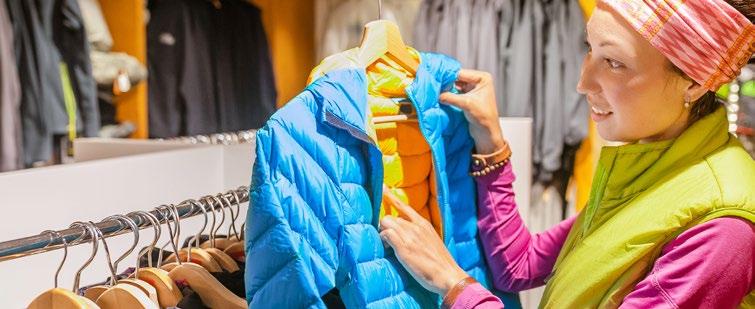
MTBs reduce or suspend import duties on certain products, including inputs and some finished products, for three years. Petitions for MTBs are fully vetted by the administration to ensure that there is no domestic production of the covered product and duty savings on each MTB do not amount to more than $500,000.
A package of MTBs that meets these criteria is then submitted to Congress for its approval. Past MTBs have saved outdoor companies $40 million, which led to lower costs, product innovation, and more American jobs. Eight footwear MTBs developed and submitted by OIA, covering a wide range of outdoor performance footwear, were included in a package of MTBs that has been pending before Congress since 2020. Failure to pass this package of MTBs has raised costs for outdoor companies and consumers and hampered innovation.
We urge Congress to pass his package of MTBs, refund duties paid on eligible products, authorize a new MTB-round and preserve the use of finished goods in MTBs.
• Supporting a new process to exclude imports from the China 301 tariffs and provide relief for small and medium-sized businesses.
We share long-held concerns by the administration and Congress about China’s intellectual property practices and forced technology transfers. We do not believe the continued maintenance of the 301 tariffs on American companies is the right approach to address this matter. Since 2018, when the 301 tariffs were enacted, outdoor companies have paid $7.4 billion in punitive tariffs on top of normal duties, including an additional $2 billion in 2022 alone. These extra taxes, on top of already outdated and unnecessarily high import tariffs on outdoor products, raise costs, stifle innovation and U.S. job growth, and put outdoor products out of reach for many consumers. OIA continues to call on the administration to remove all China 301 tariffs from outdoor products.
24
As we continue to call on the administration to remove all China 301 tariffs from outdoor products, we urge Congress to establish a new exclusion process to give stakeholders the opportunity to make the case that certain products exempt from the punitive tariffs.

• Support a level playing field for U.S. Foreign Trade Zones (FTZs) and de minimis
U.S. e-commerce distribution operations are fleeing to overseas locations. This has already resulted in an estimated 207,000 jobs lost; this number is expected to double by 2024. Furthermore, these numbers do not reflect the lost job-growth opportunities in this industry.
This can be reversed through a technical fix to allow Section 321 de minimis entry for U.S. FTZs. The proposed technical fix will also alleviate Customs and Border Patrol (CBP) compliance concerns. Unlike foreign distribution, U.S. FTZs are under CBP supervision and must adhere to strict regulatory standards. Thus, shipments originating from U.S. FTZs are significantly less likely to contain counterfeit and fraudulent contents or products not in compliance with U.S. forced labor laws.
We urge Congress to level the playing field and support de minimis entry for U.S. FTZs.
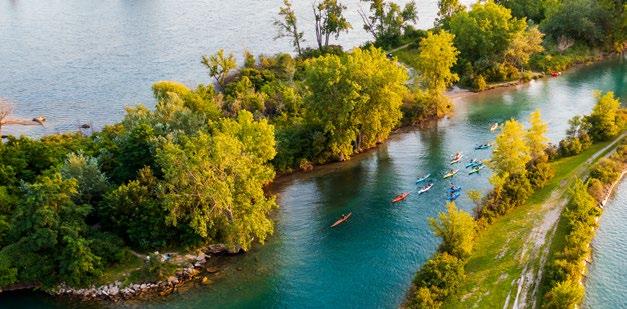
25 #OIACapitolSummit
CLIMATE

Climate change poses a significant threat to the outdoor industry. Climate-related weather events like droughts, floods, wildfires, and excessive heat have consequential impacts to the lands and water we recreate on, often resulting in the degradation of precious natural resources and recreation infrastructure and in declining hours of outdoor participation in impacted areas. In addition, worsening climate impacts increase supply chain instability and make it more challenging for outdoor businesses to predict business cycles.
The outdoor industry is a leader in sustainability and is already doing the necessary work to combat climate change. Through the OIA Climate Action Corps, outdoor industry companies can take direct action on climate-related business challenges to reach our collective goal of becoming the first climate positive industry by 2030.
26
The work of the Climate Action Corps, however, is only a small part of the solution. In order to fight climate change and protect our beloved recreation areas, policy action at the federal level must also occur. The passage of the historic Inflation Reduction Act (IRA) in 2022 saw the largest investments in climate and movement toward a sustainable future in the history of the United States, and as an industry, we need to advocate for the protection of those investments. To continue the momentum in lowering emissions and protecting our land, air, and water for future generations, we urge Congress and the administration to do the following:
• Protect the climate investments made in the IRA to allow for full implementation of the bill’s goal to reduce U.S. greenhouse gas emissions by 40% by 2030 through the following provisions:
– $369 billion in climate and clean energy investments, such as funding for the Greenhouse Gas Reduction Fund, and amendments to the federal clean energy tax credit to allow for greater ease and adoption of clean energy across the private sector
– Funding and tax credits for electric vehicle adoption for individuals and both public and private institutions, including $3 billion to improve transportation through climate positive initiatives, with 40% of funding going toward marginalized communities
– $20 billion for conservation efforts to mitigate the effects of climate change, such as funding to build climate resilience in coastal communities and grants for state and private forest owners to improve forest resilience and increase climate mitigation strategies
– $60 billion to aid disadvantaged communities impacted by climate change through implementation of measures like urban and community forestry projects and programs to address public health concerns like pollution exposure
• Trailblaze a path for new and innovative climate investments left out of IRA, including the following:
– The Clean Electricity Performance Program (CEPP), which would reduce greenhouse gas emissions in the electric power sector by issuing grants to utilities that achieve annual clean energy targets and penalties to those that do not
– The Civilian Climate Corps, a program similar to FDR’s Civilian Conservation Corps, that would aim to create jobs and training opportunities for individuals while addressing climate-related challenges such as reforestation, wildfire prevention, and infrastructure improvement
– Improving bike infrastructure and providing incentives for e-bikes to support clean, decarbonized transportation across the country
• Work with the administration on forthcoming executive actions to reduce greenhouse gas emissions by 50% by 2030 to align with climate science
27 #OIACapitolSummit
OIA STATE AND LOCAL GOVERNMENT AFFAIRS PRIORITIES
OUTDOOR ACCESS
A healthy and growing outdoor industry depends on open outdoor access for those of all abilities, ages, and backgrounds. Policies to erode barriers to the outdoors and nature-based experiences enable more diverse populations to have reliable and sustained connections to nature. Supporting grassroots organizations and grasstops stakeholders in states and local communities that create opportunities for outdoor access is a fundamental component in providing all people a chance to experience the benefits of nature. Along with members and partners, OIA is:
• Promoting the development of state-based outdoor equity funds, and encouraging lawmakers to expand funding for existing programs in New Mexico, Nevada, and other states
• Working alongside state-based outdoor recreation directors to explore further programming and policy interventions to close the nature gap in their jurisdictions (reduced fees for parks passes, gear libraries, etc.)
OUTDOOR RECREATION ECONOMY
Outdoor recreation is a growing economic force for states and communities across the country. In order to thrive and reach their optimal potential, these economies must be supported in a range of ways, including technical assistance for businesses and entrepreneurialism, continued access to resources and funding to develop and maintain recreation assets, and leadership and stewardship from strong local community builders. OIA’s work to strengthen outdoor economies includes:
• Collaborating with state-based outdoor business alliances to support the development and scaling of outdoor recreation-based economies
• Promoting business-friendly practices at the state level, including innovative policy that promotes attainable housing for gateway communities, outdoor industryspecific workforce development, and the development of outdoor recreation offices
• Collaboration with appropriate local stakeholders to develop and advocate for sustainable funding for outdoor recreation infrastructure development and maintenance
28
CLIMATE
OIA will advocate for groundbreaking and meaningful sustainability practices and natural climate solutions policies at the state level. These policies protect the spaces where recreationists connect to nature and encourage outdoor participants to become responsible and engaged stewards. OIA is linking arms with members and other organizations to promote:
• Innovative climate policy at the state and local level, including programs incentivizing further adoption of natural climate solutions and the development of green infrastructure across communities nationwide
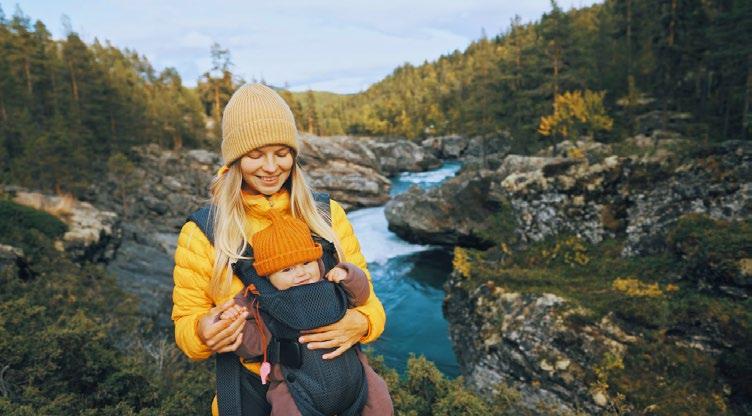
• The development of accessible bike infrastructure to combat increasing emissions from gasoline-powered transportation and to engage more communities in cycling
CONSERVATION
As business leaders in the outdoor industry—and lovers of the great outdoors—it is our responsibility to utilize our voices to push for policies that protect sensitive biodiversity, shield and connect habitat, steward sensitive watersheds, safeguard important cultural and historical antiquities, and enshrine conservation of sensitive or unique lands and waters. These policies ensure that the outdoors (and the outdoor industry) can thrive for generations to come. OIA is promoting conservation-focused policy through:
• Advocating with state-based stakeholders to pass state-level legislation and executive orders that support the Biden administration’s goal to conserve and protect 30% of America’s lands and waters by 2030
• Encouraging the creation and growth of sustainable state-based conservation funding mechanisms to ensure that the state’s historical and cultural assets and biodiversity are protected
29 #OIACapitolSummit
ACRONYMS, AGENCIES, AND KEY LEGISLATION
RECREATION AND CONSERVATION ACRONYMS
Land and Water Conservation Fund (LWCF)
The Land and Water Conservation Fund (LWCF) is a widely supported and bipartisan bill signed into law by President Lyndon Johnson on September 3, 1964, to protect and provide recreational access to our nation’s irreplaceable outdoor spaces.
Bureau of Economic Analysis (BEA) Outdoor Recreation Satellite Account (ORSA)
The Outdoor Recreation Satellite Account (ORSA) was created in the U.S. Department of Commerce’s Bureau of Economic Analysis (BEA) to measure outdoor recreation as a part of national gross domestic output and product. In the BEA’s most recent release, outdoor recreation accounted for 1.9% of the U.S. gross domestic product in 2021, contributing $862 billion to the national economy and supporting 4.5 million jobs across the nation.
Conserving and Restoring America the Beautiful (CRAB)
This Biden administration initiative is a national call to action to work collaboratively to conserve and restore the lands, waters, and wildlife that support and sustain the nation. It outlines the launch of the first-ever national conservation goal: conserving 30 percent of U.S. lands and waters by 2030. The original plan for the initiative was submitted to President Biden’s National Climate Task Force by the secretaries of the interior, agriculture, and commerce and the chair of the Council on Environmental Quality. A major component of CRAB is the America the Beautiful Challenge, which consolidates funding from multiple federal agencies and the private sector to enable grant applicants to create and execute large-scale conservation projects that address funder priorities and impact public and private lands. The challenge is administered by the National Fish and Wildlife Foundation (NFWF).
Inflation Reduction Act (IRA)
The Inflation Reduction Act (IRA) was signed into law on August 16, 2022. The $500 billion in spending outlined in the legislation will go toward the further development of a clean energy economy, climate mitigation efforts, lowering health care costs, and more.
Bipartisan Infrastructure Law (BIL)
The Bipartisan Infrastructure Law, passed in late 2021, was described as a once-in-ageneration investment in our nation’s infrastructure and competitiveness. Portions of the bill mandate direct action to address topics near and dear to the outdoor industry’s collective heart, including environmental justice and investments to modernize the nation’s supply chain.
America’s Outdoor Recreation Act (AORA)
America's Outdoor Recreation Act is one of the most comprehensive pieces of bipartisan legislation to benefit the outdoor industry in the last generation. Passing AORA with its various components is one of our lobby asks this Capitol Summit.
30
TRADE ACRONYMS
Miscellaneous Tariff Bills (MTBs)
Miscellaneous tariff bills enact the temporary reduction or suspension of duties on specific U.S. imports or other technical corrections to the U.S. Harmonized Tariff System. The House Committee on Ways and Means has initial jurisdiction over legislation to amend the U.S. tariff schedule and to alter trade legislation. The American Manufacturing Competitiveness Act of 2016 established new procedures for MTBs.
Free Trade Agreements (FTA)
Free trade agreements are comprehensive and permanent agreements that eliminate tariff and non-tariff barriers on a reciprocal basis. The U.S. maintains 14 FTAs with 20 countries. Some FTAs are bilateral, and others are multilateral.
Generalized System of Preferences (GSP)
GSP is a U.S. trade preference program benefiting the least developed countries (LDCs). GSP-eligible countries can export a certain set of products to the United States dutyfree. GSP was re-authorized in 2018 (through the end of 2020) and has since not been renewed, which is the longest period of time GSP has lapsed since its creation in 1974. Presently, the GSP program excludes apparel and footwear. OIA supported legislation that made travel goods, including backpacks, eligible for GSP in the past.
Trade Adjustment Assistance (TAA)
Trade Adjustment Assistance (TAA) is a federal program that benefits and supports U.S. workers that have been impacted by job loss due to international trade.
United States Trade Representative (USTR)
The USTR is the president’s chief trade advisor and negotiator and is a member of the cabinet. The current USTR is Ambassador Katherine Tai.
World Trade Organization (WTO)
The WTO is an international organization based in Geneva, Switzerland, that is charged with overseeing global rules on trade that have been established through a series of binding international agreements.
31 #OIACapitolSummit
KEY AGENCIES
U.S. Department of the Interior
The U.S. Department of the Interior (DOI) protects and manages America’s natural resources and cultural heritage; provides scientific and additional information about those resources; and honors its trust, responsibilities, or special commitments to Native Americans, Alaska Natives, and affiliated island communities.
DOI plays a central role in how the United States stewards its public lands, increases environmental protections, pursues environmental justice, and honors our nation-tonation relationship with tribes. The agency is home to several specialized bureaus, including the Bureau of Land Management, the Bureau of Reclamation, and the National Park Service.
Currently, DOI’s mandates under the Biden administration include addressing the four intersecting challenges of COVID-19, economic recovery, racial equity, and climate change. The current secretary of the interior is Deb Haaland, a member of the Pueblo of Laguna and the first Native American to serve in a cabinet secretary position.
U.S. Department of Agriculture
The U.S. Department of Agriculture (USDA) provides leadership on food, agriculture, natural resources, rural development, nutrition, and related issues. The department comprises 29 agencies and serve Americans through about 4,500 locations throughout the country.
The agencies within USDA relevant to OIA’s work include the U.S. Forest Service (FS), the Natural Resources Conservation Service, and Rural Development. The Forest Service sustains the health, diversity, and productivity of the nation’s forests and grasslands and manages over 10,000 developed recreation sites and over 151,000 miles of trail.
The current secretary of the USDA is Tom Vilsack, who also served as secretary for eight years under President Obama. Key USDA programs are funded by the farm bill, which is a core policy area of focus for Outdoor Industry Association in 2023.
U.S. Department of Commerce
The mission of the U.S. Department of Commerce is to create the conditions for economic growth and opportunity for all communities. The agency has 13 bureaus, including the Bureau of Economic Analysis, the Economic Development Administration (EDA), the International Trade Administration (ITA), the Minority Business Development Agency, and the National Oceanic and Atmospheric Administration.
Many of those key bureaus directly impact the outdoor industry. The Bureau of Economic Analysis houses the Outdoor Recreation Satellite Account (ORSA), which quantifies and legitimizes our industry’s economic impact across the United States on an annual basis. The EDA’s sphere of work and programs are pivotal to outdoor recreation clusters across rural and urban America. The ITA works with our industry to ensure that U.S. competitiveness is growing and works with OIA to help ensure a
32
balanced trade ecosystem doesn’t overburden the sector.
The U.S. Department of Commerce represents the voice of businesses in the federal government, while also working to drive U.S. economic competitiveness, strengthen domestic industry, and catalyze the growth of quality jobs in all communities across the country. The current secretary of the department is Gina M. Raimondo. Secretary Raimondo, a long-time small business owner, is also the first female former governor of Rhode Island.
KEY CABINET GROUPS
Council on Environmental Quality (CEQ)
The Council on Environmental Quality (CEQ) is positioned within the Executive Office of the President. The group coordinates the federal government’s efforts to improve, preserve, and protect America’s public health and environment.
Created in 1969 through the National Environmental Policy Act (NEPA), CEQ advises President Biden and develops policies on climate change, environmental justice, sustainability, public lands, oceans, and wildlife conservation. The agency is also responsible for enforcing NEPA.
Currently, CEQ is chaired by Brenda Mallory, the first African American to hold the position. Her focuses include environmental justice and climate change. Chair Mallory is also focused on accomplishing CEQ’s mandates while also advancing opportunities for job creation and economic development.
United States Trade Representative (USTR)
The United States Trade Representative (USTR) is an agency positioned within the Executive Office of the President. The agency is responsible for promoting and developing U.S. trade policy, negotiating with foreign governments on trade issues, and coordinating with trade-focused business organizations to ensure U.S. trade policy is benefitting the U.S. economy.
USTR was created in 1962 through the Trade Expansion Act and serves the president as the primary negotiator, spokesperson, and advisor on trade matters. USTR also participates in the World Trade Organization (WTO), which is the main governing body of international trade.
The current U.S. trade representative is Ambassador Katherine Tai, the first Asian American to serve in the position. Ambassador Tai formerly served as the chief trade council for the U.S. House Committee on Ways and Means during the Trump administration.
KEY LEGISLATION
America’s Outdoor Recreation Act
America's Outdoor Recreation Act is one of the most comprehensive pieces of bipartisan legislation to benefit the outdoor industry in the last generation. This act combines components of numerous formerly introduced bills, such as the Recreation Not Red-Tape Act, the Simplifying Outdoor Access for Recreation (SOAR) Act, the Outdoor Recreation Act, and others. These previously introduced provisions, as well
33 #OIACapitolSummit
as new ones, will broadly improve outdoor recreation opportunities across the country while benefitting the environment, the economy, and the health of Americans. Bills in the package include:
• Biking on Long-distance Trails (BOLT) Act
• Gateway Community and Recreation Enhancement Act
• Recreation Not Red-Tape Act
• SOAR Act
• Federal Interior Land Media (FILM) Act
• Outdoors for All Act
• Parks, Jobs, and Equity Act
• MAPLands Act
• Cape and Antler Preservation Enhancement (CAPE) Act
• Service First Act
Land and Water Conservation Fund
The Land and Water Conservation Fund (LWCF) was a widely supported and bipartisan bill signed into law by President Lyndon B. Johnson on September 3, 1964, to protect and provide recreational access to our nation’s irreplaceable outdoor spaces. Under the act, a small percentage of federal lease royalties from natural resource extraction in our nation’s Outer Continental Shelf (OCS) are to be invested in conservation and outdoor recreation. In the past, LWCF had seen a majority of its funds diverted to unrelated purposes, but the Great American Outdoors Act (GAOA), enacted in August 2020, authorized $900 million in permanent funding each year for LWCF.
Great American Outdoors Act
The Great American Outdoors Act (GAOA), passed in 2020, established the National Parks and Public Land Legacy Restoration Fund (LRF) to address overdue maintenance needs on our nation’s public lands. As mentioned above, GAOA also permanently authorized funding for the Land and Water Conservation Fund (LWCF).
Farm Bill
The farm bill is an omnibus, multiyear law that governs many agricultural and food programs. Since the first bill was introduced in the 1930s, Congress has enacted 18 farm bills. Since the 1970s, farm bills have become increasingly expansive in nature. Prominent additions to the scope of the bill include the expansion of conservation and research titles, which are important to the outdoor industry. Because the farm bill is an omnibus piece of legislation, it can create broad coalitions of support among sometimes conflicting interests for policies that individually might have greater difficulty achieving required support in any other context. OIA and partner organizations are zeroing in on rural development and conservation titles as areas of great opportunity to pursue policies and funding opportunities that will help strengthen the outdoor recreation economy and further promote our core values in
34
conservation and stewardship.

Inflation Reduction Act (IRA)
The Inflation Reduction Act (IRA) was signed into law on August 16, 2022. The $500 billion in spending outlined in the legislation goes toward the further development of a clean energy economy, climate mitigation efforts, lowering health care costs, and more. OIA members were an important voice in advocacy for the IRA through its many iterations, including the Build Back Better Act. The outdoor industry and the outdoors will benefit greatly from the legislation, including through a broad range of key opportunities across incentives to transition to renewable energy and from spending that will be invested in public lands to bolster climate resiliency.
Bipartisan Infrastructure Law (BIL)
The Bipartisan Infrastructure Law, passed in late 2021, was described as a once-in-ageneration investment in our nation’s infrastructure and competitiveness. Portions of the bill mandate direct action to address topics near and dear to the outdoor industry’s collective heart, including environmental justice and investments to modernize the nation’s supply chain. BIL increases investments in transportation, rural development, and natural spaces, creating jobs and connecting more people to our public lands and waters.
35 #OIACapitolSummit
HOW TO SOCIAL AT CAPITOL SUMMIT
SHARE YOUR #OIACAPITOLSUMMIT EXPERIENCE ON SOCIAL MEDIA WHY?
Outdoor advocacy is the backbone of ensuring a successful future for our industry, and your work on the ground in D.C. can have an even bigger impact when shared. Invite your colleagues, employees, and friends into the experience by documenting your journey on Capitol Hill. While here, you can be the catalyst for inspiring others (brands and outdoor enthusiasts) to become outdoor advocates–just by sharing what you’re up to at Capitol Summit.
TIPS & ADVICE:
Channels:
• Posting on multiple social channels will allow your message to be seen by a broader audience. Consider sharing your experience across LinkedIn, Twitter, Facebook, TikTok, and Instagram (Feed and Stories).
Content Creation:
• Take plenty of photos and videos. You’ll be glad you did when you have 10 blurry shots, but one that’s actually in focus.
• Tip: Always listen to the audio before you post a video.
• Tip: Be mindful if there are areas that say “no photos.”
• Tip: Ask for photos. DC representatives are used to these requests and would love to help.
Posting:
• Share your behind-the-scenes moments. Is this your first-time lobbying? Can’t figure out which tie to wear? These humanizing moments help make advocacy and lobbying more accessible.
• Consider sharing a photo from your brand’s channels. You don’t have to get super political, something as simple as “Our CEO is attending the Outdoor Industry Association’s Capitol Summit in D.C. to lobby for the protection of the outdoors” is a powerful way to show your consumers that you’re a brand that believes in doing good.
• Additionally, make sure your brand’s marketing team has access to the Capitol Summit Social Media tool-kit for ready-made posts.
36
Tags:
• Tag your reps in social posts. Thank them for meeting with you, share a photo from their office, and remind them of a powerful statistic shared during your meeting.
– Ex: “Great to meet with @RepRonWyden today to talk about the importance of Oregon’s outdoors. OR supports 172,000 outdoor jobs, and we can’t wait to grow that number even bigger.”
• Be sure to tag OIA so we can amplify and share.
– @outdoorindustry
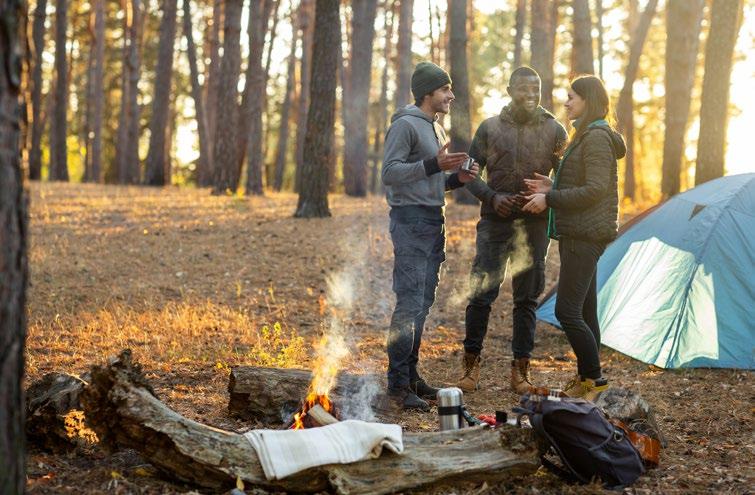
– @oia
• Unsure how to find your reps social handle? A quick tip is to google them and the social handle you’re looking for and it will appear quickly in the search results.
QUESTIONS WHILE HERE?
If you have a question about sharing on social, want help taking a photo, or need any other social media advice, find or text Jake Wheeler (OIA social media consultant) 423-718-7875.
37 #OIACapitolSummit
LOOKING AHEAD: HOW TO IMPLEMENT CAPITOL SUMMIT OUTCOMES FOR OUTDOOR INDUSTRY BUSINESSES MOVING
FORWARD
Thank you for taking the time to attend the OIA 2023 Capitol Summit! We hope you found the experience to be meaningful and that you return home energized to continue utilizing your individual organization’s voice in partnership with the industry to continue the push for meaningful political change.
Capitol Summit is not simply a two-day long convening to talk policy with our friends across the industry. It’s a time for us all to get together, be reminded of our common goals and values, and get inspired to kick off a year of activation and advocacy across the federal and state levels. Put simply: Our voice matters! We must use it today and for generations to come.
More than ever, with urgency and swift action, OIA is committed to using our “outside voice” to advocate for balanced trade policy; sustainable business solutions; and expanded, safe access to the outdoors for this generation and many more to come.
As fellow catalysts for meaningful change, here are some ways you and your colleagues can stay engaged in policy and advocacy year round:
• Explore joining one of OIA’s advisory councils
• Keep a lookout for opportunities to sign on to letters of support from OIA
• Watch for OIA’s policy alerts throughout the year
• Reach out to Rich Harper, Rebecca Gillis, or Hannah Wintucky to learn more about specific policies you are curious about
• Get together with your team and brainstorm about which policies matter the most to you and your organization’s wellbeing, and request that we add you to those topicspecific advocacy communications:
– Outdoor access and equity
– Outdoor recreation economy
– Trade
– Climate
– Sustainability
– Research
• Log in to the OIA Membership Experience hub for updated calls to action and future lobbying opportunities
• Follow us on LinkedIn
38
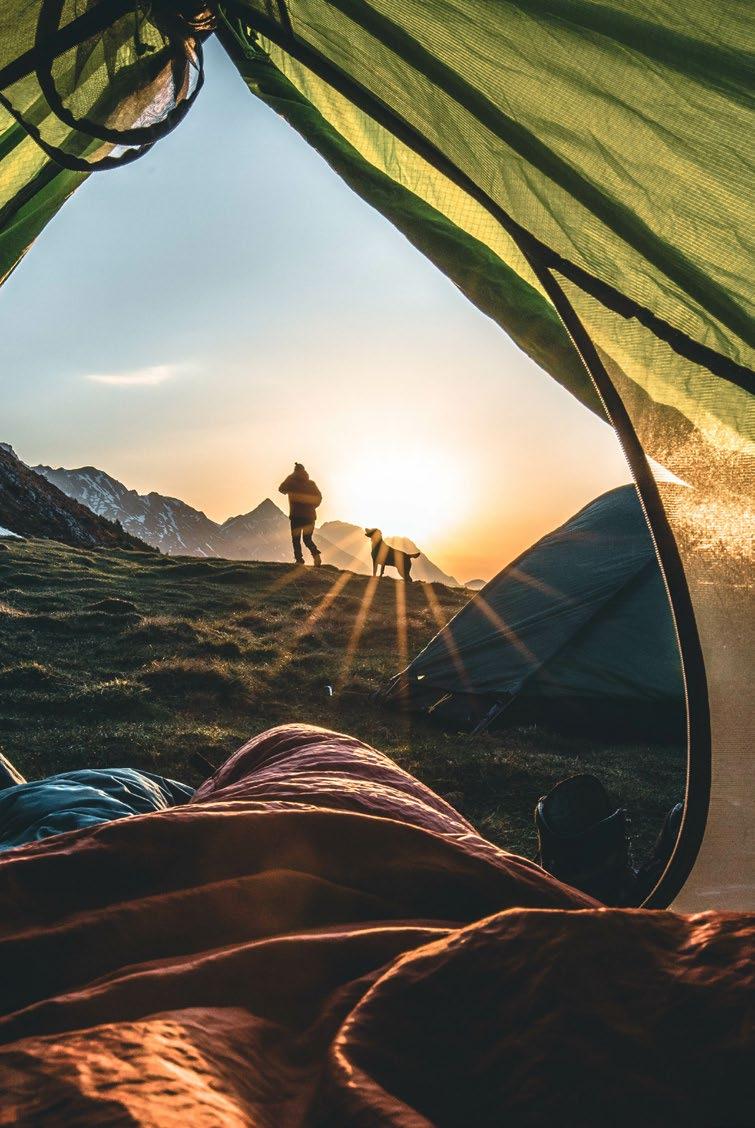
39 #OIACapitolSummit






 Kent Ebersole President, Outdoor Industry Association
Kent Ebersole President, Outdoor Industry Association


































